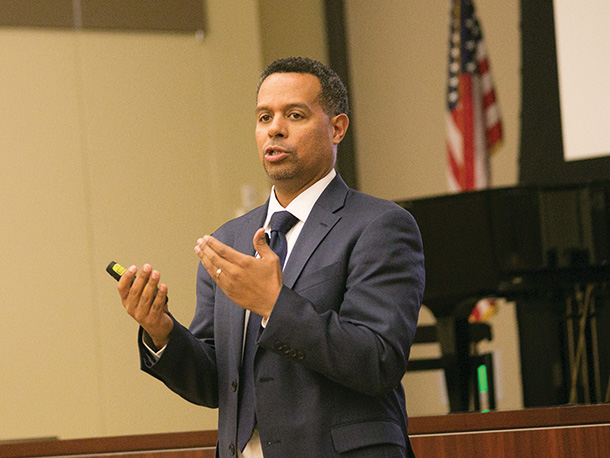As the chief diversity officer for the American Association of Medical Colleges, Marc Nivet has a message you’d never expect: Diversity is not good.
“There is nothing inherently good about diversity, there’s nothing magical about diversity,” Nivet said during a Feb. 17 lecture at Mayer Auditorium. “What is required to make diversity useful and positive and good is this concept of inclusion. Inclusion is the fuel that animates the diversity. It is what makes use of all of our different experiences, attributes, talents and inherent diverse characteristics.”
Nivet, EdD, MBA, was on the Health Sciences campus to present “Diversity 3.0: From Fairness to Excellence,” a discussion about the direction of diversity on medical campuses across the country presented by the Office of Educational Affairs and Office of Diversity and Inclusion.
“We have been thrilled to have him with us today where he has met with a number of us, including members of the Dean’s Diversity Cabinet as well as some of our student leaders,” said Educational Affairs Vice Dean Henri Ford, MD, MHA. “The message coming from him has been quite insightful and should help Keck on its path to promote diversity and also allow us to embrace what has been the fabric of USC: the importance of diversity through all of the various faculties throughout the university.”
Diversity just means differences, Nivet said, and administrators must focus on how to make sure students and faculty flourish in a diverse campus community.
“In the simple-minded way of thinking about (diversity), what we do is we count people,” Nivet said. “But we don’t make sure people count. We need to make sure that people are bringing their full selves to the institution and are being harnessed to make more of the institution.”
First-year student Nana Bonsu agreed.
“I think the idea of inclusion is important because, just because you have these numbers of minority people, it doesn’t necessarily mean that you’re doing something,” he said. “It’s a step, but if you’re not actually doing something with the minorities to make sure they feel included, then I think it’s futile.”
Nivet also emphasized that diversity is not just an important conversation — it must be an urgent priority, which resonated with several of the students in attendance.
“The school knows diversity is important,” second-year student Vanessa Arientyl said. “We’re talking about diversity, but how do we go about it? Right now, diversity is just important, but I think people recognize that it is becoming urgent. We have the potential to be frontrunners in this, so why not?”
— Melissa Masatani


